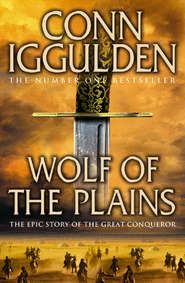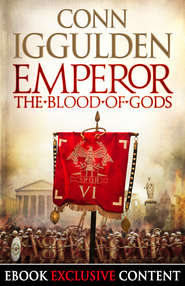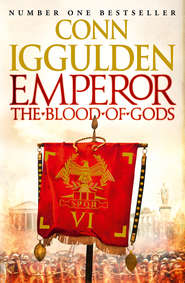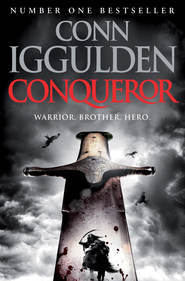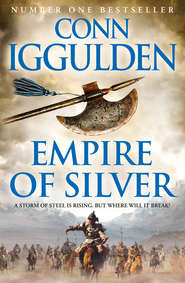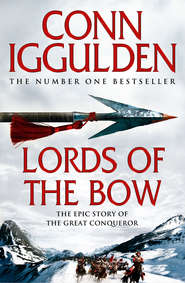По всем вопросам обращайтесь на: info@litportal.ru
(©) 2003-2024.
✖
Bones of the Hills
Автор
Год написания книги
2019
Настройки чтения
Размер шрифта
Высота строк
Поля
Three other jaguns had taken part in the ambush. Jochi saw the officers ride out of the trees where they had lain in wait all night. After years with Tsubodai, he knew each man like a brother, as Genghis had once told him to do. Mekhali and Altan were solid men, loyal but unimaginative. Jochi nodded to them both as they trotted their ponies to the field of the dead. The last of them, Qara, was a short, sinewy warrior with a face scarred from an old wound. Though he was faultlessly formal, Jochi sensed a dislike he could not understand. Perhaps the glowering man resented him for his father. Jochi had met many suspicious of his rise in the ranks. Tsubodai was not subtle in the way he included Jochi in every plan and stratagem, just as Genghis had once done with the young boy from the Uriankhai who had become his general. Tsubodai looked to the future while men like Qara imagined they saw only a spoiled young prince, promoted beyond his skill.
As Qara rode up and grunted at the sight of the dead knights, Jochi realised he was no longer the man’s superior. He had accepted the silver with a battle looming and still felt the honour of being trusted with a hundred lives. Yet it meant that, for a time at least, Qara no longer had to watch himself around the khan’s son. One glance told Jochi the wiry little warrior had already thought it through.
‘Why are we waiting here?’ Qara said suddenly. ‘Tsubodai will be attacking as we smell the grass and stand idle.’
Jochi resented the words, but he spoke lightly, as if Qara had merely greeted him. If the man had been a true leader, he would already have begun the ride back to Tsubodai. In a flash of insight, Jochi understood that Qara still looked to him for orders, despite his drop in rank. Glancing at Mekhali and Altan, he found they too were watching. Perhaps it was just their habit, but he felt an idea begin to form and knew he would not waste the moment.
‘Do you see their armour, Qara?’ he said. ‘The first piece hangs from the helmet, covering their faces except for the eyes. The second cloth of iron rings reaches right to their knees.’
‘It did not stop our shafts,’ Qara replied with a shrug. ‘When they are unhorsed, they move so slowly it is easy to bring them down. We do not need such poor protection, I think.’
Jochi grinned up at the man, enjoying the confusion it brought.
‘We do need it, Qara.’
High in the hills above the valley, Tsubodai waited on foot, his pony snuffling among dead pine needles. Almost five thousand men rested around him, waiting for his decision. He waited on the scouts he had sent out. Two hundred had ridden in all directions, their reports allowing the general to form a picture of the area for many miles around.
He knew Jochi’s ambush had been a success almost before it was over. One thousand fewer of the enemy left only ten, but it was still too many. The column of knights moved slowly through the river valley, waiting for the attack group to return victorious. They had not brought bowmen into the wilderness, a mistake that would cost them dearly. Yet they were large men and so strong that Tsubodai could not risk a simple frontal assault. He had seen knights stuck with arrows who had still fought through to kill two or even three of his. They were warriors of great courage, but he thought it would not be enough. Brave men come forward when they are attacked and Tsubodai planned accordingly. Any army could be routed in the right conditions, he was certain of it. Not his own, of course, but that of any enemy.
Two of the scouts galloped in to mark the latest position of the Russian force. Tsubodai made them dismount and draw on the ground with sticks so he could be sure there was no misunderstanding.
‘How many scouts do they have out?’ he asked.
The warrior drawing with a stick replied without hesitation.
‘Ten in the rear, general, on a wide sweep. Twenty to the front and flanks.’
Tsubodai nodded. He knew enough to move at last.
‘They must be killed, especially the ones behind the knights’ column. Take them when the sun is highest and do not let even one escape. I will attack as soon as you signal by flag that the scouts are down. Repeat your orders.’
The warrior spoke quickly, word-perfect as he had been trained to be. Tsubodai allowed no confusion in the field. For all the use of flags to communicate over vast distances, he was still forced to rely on dawn, noon and sunset as the only markers for time. He looked up through the trees at the thought, seeing that the sun was not far off midday. It would not be long and he felt the familiar flutter in his stomach that came before a battle. He had told Jochi it was to train him and that was true, but not the whole truth. Tsubodai had held back that the knights travelled with portable forges in their baggage train. Blacksmiths were more valuable than any other artisan they could capture and Tsubodai had been intrigued by reports of iron carts belching smoke as they rolled.
Tsubodai smiled to himself, enjoying the rising excitement. Like Genghis, he could find no love for the sacking of towns and cities. It was something that had to be done, of course, as a man would pour boiling water on a nest of ants. It was the battles Tsubodai wanted, each one proving or increasing his mastery. He had found no greater joy than out-thinking his enemies, confounding and destroying them. He had heard of the strange quest the knights were on, to a land so distant that no one knew its name. It did not matter. Genghis would not allow armed men to ride his lands — and all lands were his.
Tsubodai scuffed the drawings in the dirt with the toe of his boot. He turned to the second scout who waited patiently, in awe of the general.
‘Ride to Jochi and find what has delayed him,’ Tsubodai ordered. ‘He will sit at my right hand for this attack.’
‘Your will, lord,’ the scout said, bowing before he scrambled to his horse and went careering through the trees at breakneck speed. Tsubodai squinted through the branches at the sun. He would move very soon.
In the thump and thunder of ten thousand horses, Anatoly Majaev glanced over his shoulder at the ridge little Ilya had disappeared behind. Where had his brother gone? He still thought of him as little Ilya, despite the fact that his brother outweighed him in both muscle and faith. Anatoly shook his head wearily. He had promised their mother he would look after him. Ilya would catch up, he was certain. He had not dared halt the column now the Mongols had shown they were in the area. Anatoly had sent scouts all around, but they too seemed to have vanished. He looked behind again, straining his eyes for the banners of a thousand men.
Ahead, the valley narrowed in a pass through hills that could have been part of the Garden of Eden. The slopes were green with grass so thick a man could not hack through the roots in half a day. Anatoly loved this land, but his eyes were always on the horizon, and one day he would see Jerusalem. He muttered a prayer to the Virgin under his breath and at that moment the pass darkened and he saw the Mongol army riding out against him.
The scouts were dead then, as he had feared. Anatoly cursed and could not help but look back for Ilya once more.
Shouts came from behind and Anatoly turned completely in the saddle, swearing at the sight of another dark mass of riders coming up fast. How had they gone around him without being spotted? It defied belief to have the enemy move like ghosts through the hills.
He knew his men could scatter the Mongols in a charge. Already, they had unhooked their shields and raised them, looking to him for orders. As the eldest son of a baron, Anatoly was the most senior officer. Indeed, it had been his family who had financed the entire trip, using some of their vast fortune to earn the goodwill of the monasteries that had become so powerful in Russia.
Anatoly knew he could not charge with the entire baggage train and rear ranks exposed. Nothing unnerved fighting men more than being struck from before and behind at the same time. He began to shout an order for three of his officers to take their centuries and wheel around to charge the rear. As he turned, a movement on the hills caught his eye and he grinned in relief. In the distance, a line of Russian heavy horse came back over the ridge, banners flying lightly in the breeze. Anatoly judged the distances and made his decision. He called a scout over to him.
‘Ride to my brother and tell him to hit the force at our rear. He must prevent them from joining the battle.’
The young man raced away, unencumbered by armour or weapons. Anatoly turned to the front, his confidence swelling. With the rear secured, he outnumbered those who were galloping towards him. His orders had taken only moments and he knew he could punch through the Mongols like an armoured fist.
Anatoly pointed his long spear over his horse’s ears.
‘Charge formation! For the white Christ, onward!’
Anatoly’s scout raced at full gallop across the dusty ground. Speed was everything with two armies converging on the column. He rode with his body pressed as low as he could go, the horse’s head lunging up and down by his own. He was young and excited and rode almost to Ilya Majaev’s men before pulling up in shock. Only four hundred had come back over the crest and they had been through hell. Brown slicks of blood showed on many men as they approached and there was something odd about the way they rode.
The scout suddenly understood and heaved at his reins in panic. He was too late. An arrow took him under a flailing arm and he tumbled over the horse’s ears, making the animal bolt.
Jochi and the other Mongols did not look at the prone figure as they galloped past. It had taken a long time to pull the chain mail off the dead, but the ruse was working. No force rode out to cut them off and, though the Russians didn’t know it, they were being attacked on three sides. As the slope lessened, Jochi dug in his heels and brought the heavy spear out of its leather socket. It was a cumbersome thing and he had to strain to hold it steady as he and his men thundered towards the Russian flank.
Anatoly was at full gallop, more than half a ton of flesh and iron focused on a spear point. He saw the front ranks shudder as the Mongol archers loosed their first shafts. The enemy were fast, but the column could not be held back or even turned at that speed. The noise of shield impacts and hooves was deafening, but he heard screams behind him and wrenched himself back to clarity. He was in command and, as his mind cleared, he shook his head in horror. He watched Ilya strike the main flank, cutting into the very men who had pledged themselves to the Majaev family on the pilgrimage.
As he gaped, Anatoly saw the men were smaller and wore bloody iron. Some had lost their helmets in the first clash to reveal yelling Mongol faces. He blanched then, knowing his brother was dead and the twin attack would crush the rear ranks. He could not turn and, though he bawled frantic orders, no one heard him.
Ahead, the Mongols let them come in, loosing shafts by the thousand into the Russian horsemen. The shields were battered and the column jerked like a wounded animal. Men fell by the hundred. It was as if a scythe had been drawn across the face of the column, cutting through living men.
Behind, the Mongols rolled up the baggage train, killing anyone on the carts who raised a weapon. Anatoly strained to think, to make out details, but he was in among the enemy. His spear ripped along a horse’s neck, opening a great gash that spattered him in warm blood. A sword flashed and Anatoly took the blow on his helmet, almost losing consciousness. Something hit him in the chest and suddenly he could not breathe, even to call for help. He strained for just a cupful of air, just a sip, but it did not come and he collapsed, hitting the ground hard enough to numb his final agony.
At the fires that evening, Tsubodai rode through the camp of his ten thousand. The dead knights had been stripped of anything valuable and the general had pleased the men by refusing his personal tithe. For those who received no pay for their battles, the collection of bloodstained lockets, rings and gems was something to covet in the new society Genghis was creating. A man could become wealthy in the army of the tribes, though they thought always in terms of the horses they could buy with their riches. The knights’ forges were of more interest to Tsubodai, as were the spoked cartwheels themselves, ringed in iron and easier to repair than the solid discs the Mongols used. Tsubodai had already instructed the captured armourers to demonstrate the skill to his carpenters.
Jochi was examining the forehoof of his favourite pony when Tsubodai trotted up to him. Before the younger man could bow, Tsubodai inclined his head, giving him honour. The jagun Jochi had commanded stood with pride.
Tsubodai lifted his hand to show Jochi the gold paitze he had taken from him before noon.
‘You had me wondering how Russians could come back from the dead,’ Tsubodai said. ‘It was a bold stroke. Take this back, Jochi. You are worth more than silver.’
He tossed the gold plaque through the air and Jochi caught it, struggling to keep his composure. Only the praise of Genghis himself would have meant more at that moment.
‘We will ride home tomorrow,’ Tsubodai said, as much for the men as Jochi. ‘Be ready at dawn.’
CHAPTER TWO
Chagatai felt an itch in his left armpit, where sweat dribbled under his best armour. Though he was the second son of the khan, he sensed it would not be right to give the spot a good scratch while he waited for the king of Koryo.
He risked a quick glance at the man who had brought him to the distant, walled city of Songdo. The hall of kings was stifling in the midday heat, but Jelme showed no discomfort in his lacquered armour. Like the courtiers and the royal guards, the Mongol general could have been carved out of wood.
Chagatai could hear water running in the far distance, the gentle sound somehow magnified in the oppressive heat and silence. The itch became maddening and he struggled to think of something else. As his gaze rested on a high ceiling of white plaster and ancient pine beams, he reminded himself that he had no reason to feel intimidated. For all their dignity, the Wang dynasty had not been able to crush the Khara-Kitai when those people came into their land from Chin territory and built fortresses. If Jelme had not volunteered his army to burn them out, the Koryon king would still be a near prisoner in his own palace. At fifteen years old, Chagatai felt a vague smugness at the thought. He had all the pride and arrogance of a young warrior, yet in this case he knew it was justified. Jelme and his warriors had come into the east to see what armies might stand against them and view the ocean for the first time. They had found enemies in the Khara-Kitai and driven them out of Koryo like whipped dogs. Chagatai knew it was only just that the king pay a tribute, whether he had asked for help or not.
Sweating in the heavy air, Chagatai tortured himself with memory of the breeze off the sea in the south. The cool wind had been the only good thing about that blue vastness, in his opinion. Jelme had been fascinated by the Koryon ships, but the thought of wanting to travel on water baffled Chagatai. If it could not be ridden, he had no use for it. Even the memory of the royal barge swaying at anchor made his stomach clench.
A bell sounded out in the courtyard, the tone echoing through gardens where bees buzzed in hives around acacia blossoms. Chagatai pictured the Buddhist monks heaving on the log that struck the great bell and he straightened, once more aware of how he stood. The king would be on his way and his torment would come to an end. He could stand an itch a little longer: just the thought of relief made it seem bearable.






